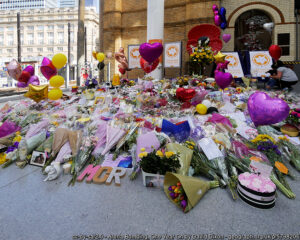 Public Inquiry Finds Missed Opportunities To Prevent Manchester Arena Bombing
Public Inquiry Finds Missed Opportunities To Prevent Manchester Arena Bombing
A concerned man reported Salman Abedi to a security guard minutes before the terror attack, the public inquiry heard.
That was the last missed opportunity amongst many. The public inquiry believes it was possible to prevent the devastating atrocity or reduced deaths.
A published report calls into question the policing, security service and the Manchester Arena operators as Salman Abedi managed to hover around the 2017 Ariana Grande concert.
Once the crowds of fans left the arena, Abedi detonated his improvised explosive device, killing 22 and injuring hundreds.
The chair of the inquiry, Sir John Saunders, said no one responsible for the arena security “believed it could happen to them”.
He added, “Abedi should have been identified on 22nd May 2017 as a threat by those responsible for the security of the arena and a disruptive intervention undertaken.”
“Had that occurred, I consider it likely that Abedi would still have detonated his device, but the loss of life and injury is highly likely to have been less.”
Security guard Mohammed Agha, 19, missed a grave opportunity as Christopher Wild challenged Abedi about his bag and raised his concerns with the officer. As a result of his efforts, the security guard did not take adequate steps to address the situation.
Tragically, security fobbed off Mr Wild. In an attempt to take action, Mr Agha called over his colleague Kyle Lawler, 18. Mr Lawler felt something was wrong but was conflicted because he was fearful of being branded a racist. He didn’t want to get in trouble if he got it wrong.
The report described Abedi as visibly weighed down by a 30 kg bomb in a backpack. Also, on a warm evening, he was overdressed and wearing a hat. Those observations should have caused a trained person to become suspicious and take action.
Effectively, the security guards did not report concerns to anyone. Sadly, Mr Wild’s view that Abedi might let a bomb off came true.
The inquiry questioned if it was possible to prevent the bombing beforehand.
Upon returning from Libya after visiting his family on 18th May 2017, Abedi made three reconnaissance visits to the arena.
If the arena operators expanded their security perimeter to the surrounding area, security guards may have spotted Abedi. Then security could have searched him before entering the City Room.
On the night of the attack, Abedi took a tram to Manchester Victoria station and passed police officers and security guards. He went on to the City Room and hid in a CCTV blindspot.
Sir John Saunders presumed, “He had no doubt identified this area during his hostile reconnaissance. Had the area been covered by CCTV so that there was no blind spot, it is likely that this behaviour would have been identified as suspicious.”
Abedi then left the City Room. He stayed in the complex and returned a short time after. Immediately, he went back to the blindspot.
British Transport Police officers had instructions to patrol the area and stagger their breaks before the concert ended. They ignored that instruction. The officers took unjustifiably long breaks.
That meant no police were in the Victoria Exchange Complex or the City Room for half an hour before the bombing.
Before Mr Wild raised the alarm, a woman told a police officer that Abedi was praying. The officer did not take action, and Sir Saunders felt the response was understandable.
In conclusion, either the police or security guards should have taken action. They could have saved lives before fans started flowing into the City Room.
With a report of a suspicious man with a rucksack, the police, security service and Manchester Arena operators could have prevented people from leaving or entering through the City Room.
If approached and confronted by security or the police, Abedi may have left the City Room or detonated his device. Either way, fewer people would have been killed.

